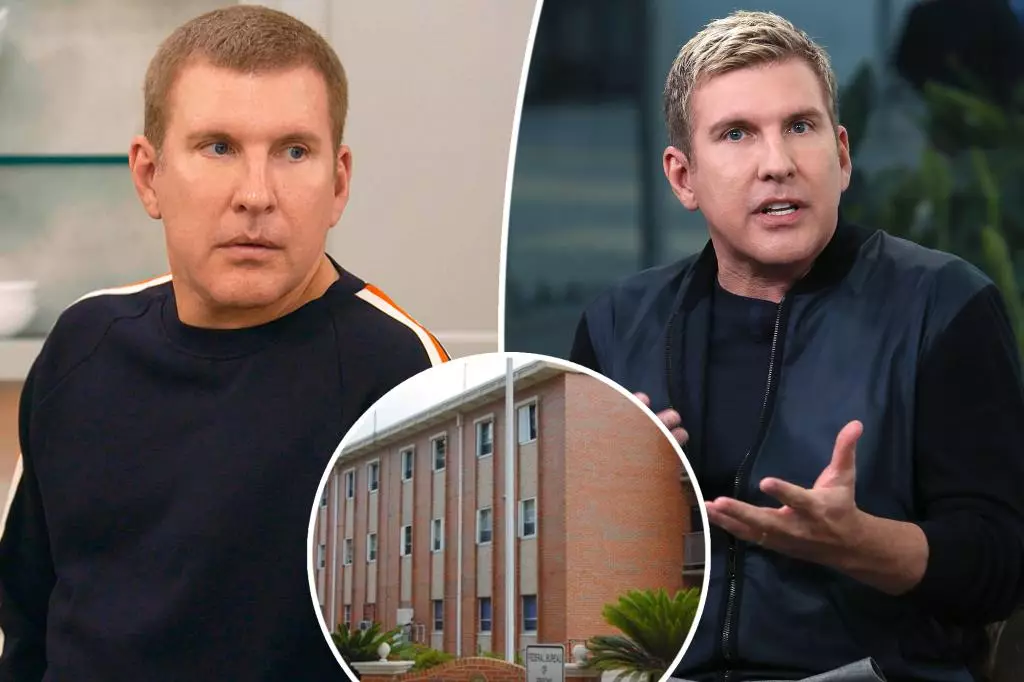Todd Chrisley, a name once synonymous with luxury and the glitzy life portrayed on the reality show “Chrisley Knows Best,” has seen his fortunes take a dramatic turn. Found guilty of bank fraud and tax evasion in 2022, Chrisley was sentenced to 12 years in prison. This article delves into his current circumstances, the fallout from his convictions, and the complexities of life behind bars.
Recent reports reveal that Todd Chrisley has been removed from his position as an administrative assistant to the Chaplain at the Federal Prison Camp Pensacola in Florida. His attorney, Jay Surgent, disclosed that Chrisley, despite serving in this role for nearly two years, was dismissed without a clear explanation. He was accused of having inappropriate conversations with participants of the Residential Drug Abuse Program, a claim that has not been substantiated beyond the initial allegation. This sudden termination from a voluntary position, which he held with pride, has left Chrisley disheartened and yearning for a semblance of normalcy amidst his incarceration.
The implications of this dismissal are profound, as it not only strips him of a sense of purpose within the prison environment but also suggests underlying tensions that might not be visible to the public eye. Chrisley’s experience in the chapel had been marked by positive feedback from the Chaplain, further complicating the rationale behind his departure.
The legal struggles of Todd and Julie Chrisley have taken a toll not just on the couple but also on their family. The Chrisleys were found guilty of submitting fake documents to financial institutions, a serious crime that resulted in significant prison sentences. Beyond personal embarrassment and societal shaming, their sentencing has resulted in lasting consequences for their children, particularly their daughter Savannah Chrisley, who has become a vocal advocate for her father.
In November 2023, Savannah revealed that her father faced retaliatory actions for her public advocacy, adding another layer of distress to an already challenging situation. According to her, Todd has experienced increased difficulties within the prison system partly due to her outspoken stance regarding his treatment. She remarked, “The moment you start speaking out, you have to pay for it,” highlighting not only her concern for her father’s welfare but also the harsh realities of navigating the bureaucracy of the penal system.
Todd Chrisley’s experiences go beyond the emotional and social ramifications of his imprisonment; they extend into the realm of physical conditions within the facility. According to interviews he gave to media outlets, he described unsanitary living conditions that included dated food and infrastructure issues such as rodents in food storage areas. Such statements reflect a grim picture of life behind bars, raising important questions regarding the treatment of inmates and the standards upheld by correctional facilities.
This troubling environment adds another layer of stress not only for Chrisley but for all inmates who may be facing similar conditions. It begs the question: How do we address these systemic issues to ensure humane treatment for all individuals, regardless of their past?
Chrisley’s journey illustrates a broader narrative about the fallibility of celebrity culture and the legal system. When ordinary individuals are incarcerated, it often flies under the radar. However, when high-profile figures like Chrisley face legal consequences, they become the centerpiece of public discourse. This ongoing saga opens dialogues about accountability, privilege, and the disparity found within the legal system.
As Todd Chrisley’s case unfolds, it raises critical issues surrounding the treatment and rehabilitation of inmates, particularly those like him who have fallen from grace after basking in the limelight. Siddharth Kothari, a criminal justice reform advocate, notes, “The public must grapple with the reality that those imprisoned are in crucial need of a support system to aid their reintegration rather than exacerbating their suffering.”
The narrative of Todd Chrisley serves as a cautionary tale about the volatility of fame, fortune, and the subsequent consequences that can arise from it. As Todd navigates the challenges of incarceration – from loss of purpose to the distressing living conditions – his story underscores the complexity of the human experience, where redemption is often obscured by the weight of past transgressions. Whether Chrisley can reclaim his narrative remains to be seen, but it’s clear that his journey has resonated far beyond the walls of the prison, echoing sentiments about accountability, justice, and reform for all.

